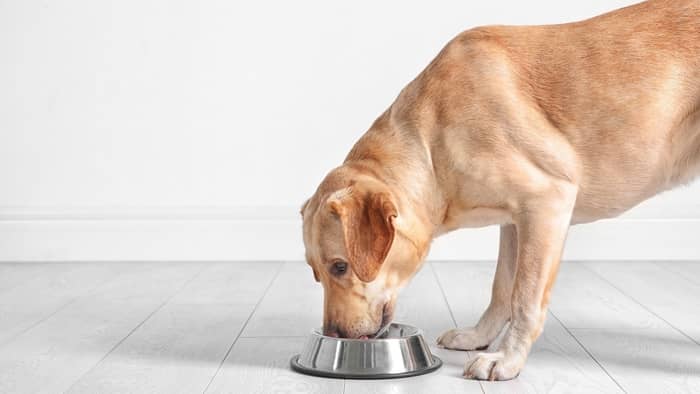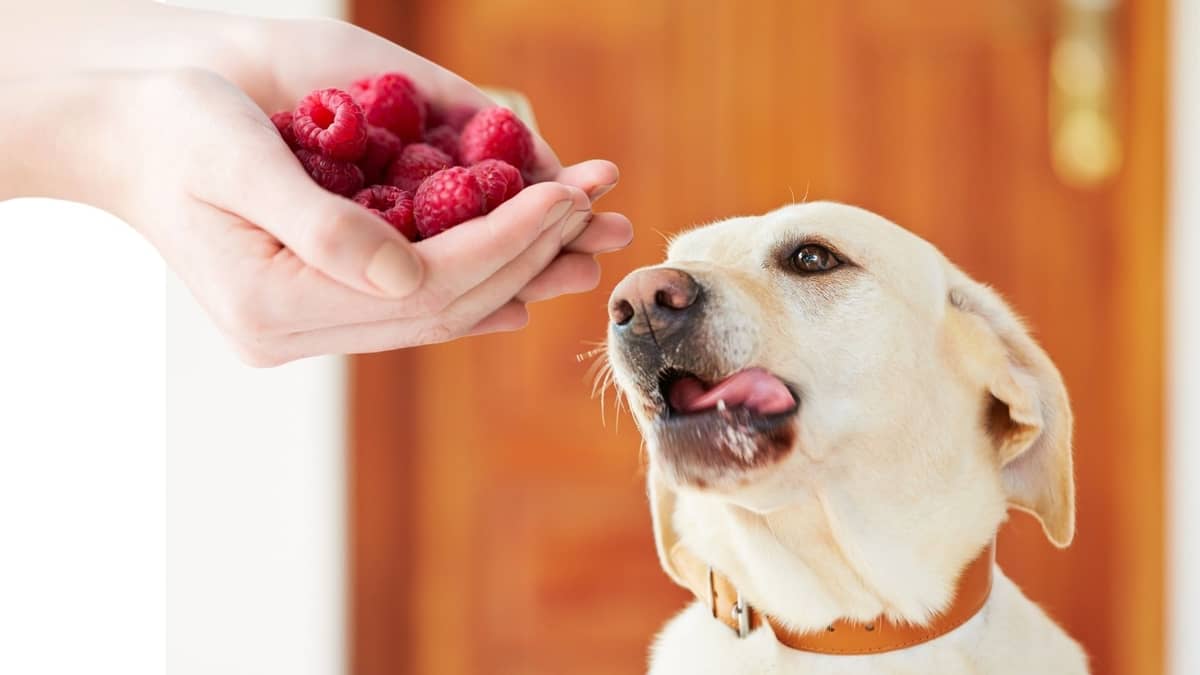Last Updated on November 11, 2023 by Linda Richard
Dogs may be omnivores but they can’t eat everything which brings up questions such as can dogs have raspberries or are they toxic to them? This question can seem intuitive but most people’s answers go either way. Dogs’ dietary preferences are just that weird. Apples are fine, grapes are poison – the line between fruits is just blurry.
So, can dogs eat raspberries? Do they bring any health benefits to a dog’s diet, or are they a health hazard? And, if the latter is true, what can you do to help your dog? We’ll try to answer all that below.
Table of Contents
Can Dogs Have Raspberries?
Generally speaking – yes, dogs can eat raw raspberries. In moderation, these fruits are not toxic to dogs the way grapes are. And, since raspberries are low on sugar and calories, they won’t make your dog fat either. That last part is especially nifty for breeds prone to obesity like the Labrador.
At the same time, raspberries are rich in fiber, vitamin C, and manganese which are all great for a dog’s diet. This doesn’t mean that you should start adding raspberries to your dog’s breakfast and dinner, of course – they are not suited to be a core part of a canine’s diet. The main part of any dog’s diet should still be good ol’ high-quality dog food.

What Are The Main Health Benefits Of Giving Raspberries To Dogs?
If you are to give your dog a few raspberries as a snack from time to time, what are the exact health benefits you can expect? Here’s a quick breakdown:
- Raspberries are full of powerful antioxidants which are great for preventing things such as heart disease, cancer, diabetes, arthritis, and more. Arthritis and heart disease are common problems for Labradors so this is great news for Labrador owners.
- Vitamin C, K, and B-complex are all prevalent in raspberries which makes these fruits a great dietary supplement.
- Minerals such as manganese, potassium, folic acid, magnesium, copper, iron, and others that further enrich your dog’s diet
- The extra dietary fiber provided by raspberries is excellent for your dog’s digestive tract. In that way, it’s also great for preventing obesity.

Learn more about: Champagne Lab vs Yellow Lab Differences You Need To Know
Are Raspberries Okay For Dogs As A Part Of Their Diet?
Do all these benefits mean that raspberries are an important regular inclusion to a dog’s diet? Yes and no. While raspberries are great in many ways, there are a few aspects of these berries that make them a bad idea for regular intake. So, while giving your dog a handful of raspberries as a treat every once in a while is all right, doing so on a daily basis isn’t recommended.
What Are The Main Health Risks Of Giving Raspberries To Dogs?
The biggest health drawback of giving your dog raspberries is a compound called xylitol. This is an all-natural sweetener that can also be found in human foods as well as other fruits and vegetables. Essentially, it’s a natural alternative to sugar.
Xylitol is safe for humans and is tolerable for dogs in minor quantities. However, after enough consumption, it can be toxic for dogs. Going overboard with this sweetener can lead to problems such as hypoglycemia and liver disease.
In addition, gastrointestinal indispositions such as vomiting, constipation, and diarrhea are also possible if your dog has eaten too many raspberries all at once.

But We Said That Raspberries Are Not Toxic To Dogs?
Technically, they aren’t. Not in the same way grapes are. While a single grape can almost instantly tople your dog sometimes, raspberries are perfectly fine in moderation. The xylitol in them can only become toxic if you go overboard with them.
How Many Raspberries Are Too Much For Your Dog?
The general rule of thumb for mid-sized and large breeds like the Labrador is one average cup of raspberries at a time. This shouldn’t be done daily too – a maximum of once a week should be your limit, preferably even once every other week.
For smaller dog breeds or younger pups, you should refrain to half a cup at a time, max. Giving your dog more than that can spell disaster due to all the xylitol in raspberries.
Even sugar, which these berries aren’t too rich in, can start causing problems after a certain dose. Raspberries are about 4% sugar by weight which is less than carrots (5%) but even that can add up with regular intake.
What Should You Do If Your Dog Has Eaten Too Many Raspberries?
The first thing you may notice if your dog has eaten too many raspberries all at once is indigestion. This can take the form of either constipation, vomiting, or diarrhea. You should tackle this situation the way you’d tackle digestive problems in any other case:
- Call your veterinarian and explain the issue. Your vet will know your dog personally and will be able to give you some personalized advice in addition to the broad tips we are listing here.
- Keep the dog well-hydrated if the vomiting and/or diarrhea have been excessive. This is especially true on hot summer days but applies all the time. Both vomiting and diarrhea dehydrate the body so that’s the immediate danger.
- If the immediate problem is constipation or discomfort, inducing vomiting can help your dog get rid of some of the excess raspberries in its system. Just make sure to then hydrate your pooch. Also, never do this without talking with your vet first.
- If the problem persists, get your dog to the vet as soon as possible. Even if the problem passes, you should still schedule a vet visit in the following days.
So, Are Raspberries Safe For Dogs?
Yes, as long as you are careful. You can make raspberries an occasional treat as a reward for certain behavior. For example, if your dog hates going to the vet but loves raspberries, a small cup can be a nice reward. Or, if you like going to a lake with your lab to swim once or twice a month, a cup of raspberries can make the experience even better.
Just make sure that you don’t overdo it. Be especially careful with leaving large bowls of raspberries and other fruits at home too.


5 thoughts on “Can Dogs Have Raspberries Or Are They Toxic To Them?”